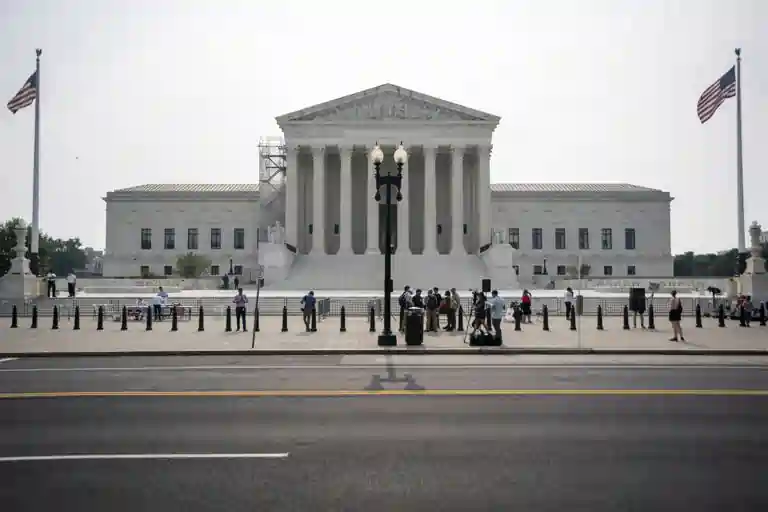Supreme Court ends its term with rulings that raise concerns about the curtailment of rights
Washington, Jun 30 – The U.S. Supreme Court, with a conservative majority, ruled Friday that a business can refuse to serve LGTBI customers, which along with the cancellation of student debt – Joe Biden’s star measure – has raised concerns among rights advocates and the White House.
Ever since the conservative supermajority propped up by former President Donald Trump (2017-2021) ended federal protection for abortion a year ago, all eyes were on the Supreme Court and what rights the court would curtail.
And despite having granted some victory to progressives this year, the highest US court dealt a blow to the LGTBI collective, a target of Republicans in the US, by giving the reason to a Christian graphic designer, Lorei Smith, who refuses to create websites for weddings of gay couples.
Conservative Judge Neil Gorsuch, who wrote the decision, wrote that Smith’s refusal is covered by the First Amendment of the U.S. Constitution, which protects freedom of speech and religion.
However, in a dissenting opinion, progressive Justice Sonia Sotomayor warned that for the first time in history the court is handing a company the constitutional right to “refuse to provide services to members of a social minority.”
BIDEN: RULING OPENS THE DOOR TO DISCRIMINATION
As President Joe Biden warned after the ruling was issued: with this decision the Supreme Court has opened the door to anti-LGBTBI discrimination and “undermines” all those laws that protect Americans from discrimination, including discrimination based on gender, color or religion.
Beyond this resolution, the court ended this Friday with one of the star measures of the Biden Administration, the cancellation of student debt, a ruling on which experts and student organizations warned this Friday that it will especially affect students with lower incomes.
These two decisions come after the Supreme Court on Thursday backed the elimination of affirmative action on racial grounds in universities, which became especially important in the country during the movement to defend the civil rights of African-Americans and the end of racial segregation in schools in the 1950s.
Specifically, the court’s six conservative justices opined that Harvard and the University of North Carolina, two of the nation’s longest-running institutions, violated the Constitution by using race as a factor in the admissions process, although they left room to consider students’ experience with racism on an individual basis.
SUPREME COURT UPHOLDS PROGRESSIVES ON ELECTION ISSUES
Despite these setbacks, some of the most far-reaching rulings of this course validated the concerns and arguments of progressive activists on election issues.
The most important case in this regard, and whose ruling was announced earlier this week, threatened to formalize a controversial constitutional theory that would have radically changed the way elections are conducted in the country.
In “Harper v. Moore,” North Carolina Republican lawmakers had asked the court to rule on the merits of this theory, which suggests that state legislatures have absolute authority to draw electoral maps, without judicial oversight.
The Supreme Court sharply rejected this interpretation of the Constitution, ruling that “the Elections Clause does not insulate state parliaments from the ordinary exercise of judicial oversight.”
In two decisions also on voting rights, the nation’s highest court ordered the states of Alabama and Louisiana, both governed by conservatives, to redraw their electoral maps to better represent the African-American citizenry.
Finally, the justices agreed with Biden, ruling last week that Republican prosecutors in Texas and Louisiana could not sue the Administration to stop enforcement of an immigration rule that allows deportation of citizens who pose a threat to public safety to be prioritized.
RELIGIOUS RIGHTS FIRST AND FOREMOST
In most cases, however, the judges either ruled against some of the Democrat’s pillars of government or decided to expand religious rights to the detriment of minority protections – one of the main fears of progressives in the wake of the abortion ruling.
Beyond the web designer’s case, the court unanimously upheld a Christian letter carrier who was sanctioned by the U.S. Postal Service for refusing to work on Sunday, ruling that employers must demonstrate a clear detriment to their business to refuse to accommodate their employees’ requests on religious grounds.
Legal controversies aside, the course has been marked by controversy sparked by investigations by ProPublica media, which revealed that two of the court’s most right-wing justices, Clarence Thomas and Samuel Alito, accepted million-dollar gifts from Republican donors.
In addition, rumors of the possible retirement of both judges could mark in the coming months the electoral campaign for the 2024 elections, since it is the U.S. president who is in charge of nominating the new judges of the court.

